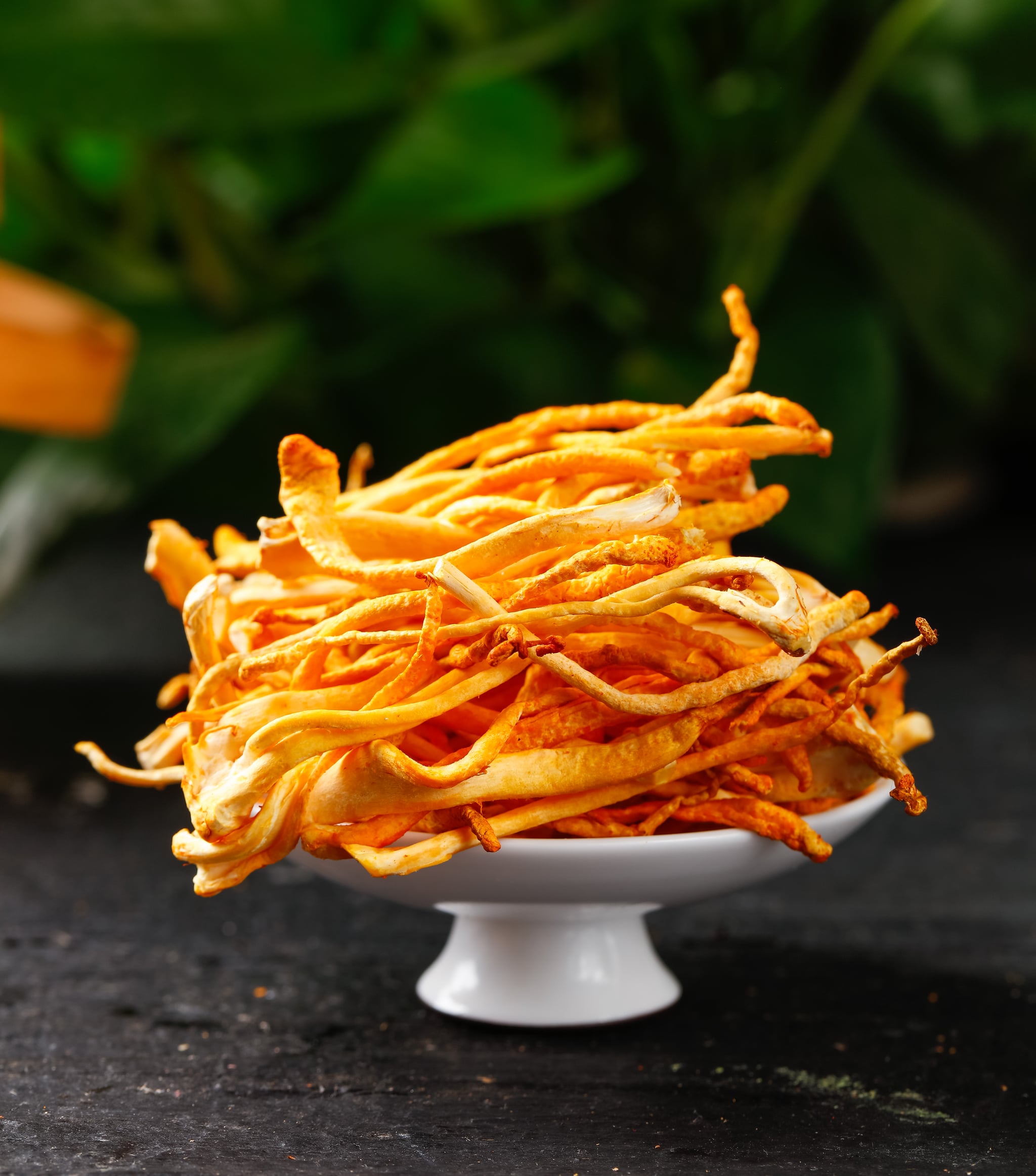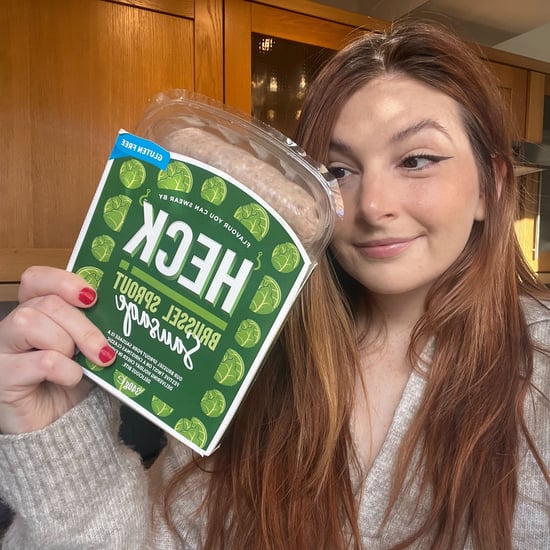What Is Cordyceps? Benefits and Dangers of the Fungus
"The Last of Us" Makes Cordyceps Look Bad, but It Actually Has Health Benefits
Watch out! This post contains spoilers.

If you've watched HBO's "The Last of Us," the sight of mushroom coffee or cordyceps supplements at the health-food store might set off alarm bells. In the show and video game's postapocalyptic universe, being infected by the mutated cordyceps fungus is the biggest threat to survival and the cause of a full-blown pandemic. Accidentally get bitten by someone who's already been infected — or in the video game, breathe in its spores — and the fungus will take over your brain.
But as dangerous as the fungal infection is in "The Last of Us," in reality, cordyceps won't turn you into a clicker. While the cordyceps fungus does exist, the mutated version in the show is based on a specific species called ophiocordyceps unilateralis. It infects insects in a way similar to what's portrayed on the show, taking over the host's body, but in humans, it's currently biologically impossible. Meanwhile, the cordyceps supplements that have been around for long before the show are instead sourced from commercially grown cordyceps militaris, and they don't result in any sort of brain control or zombification. But what exactly is cordyceps doing in the supplement aisle?
Learn about the real-life cordyceps benefits and dangers, and what you need to know before taking a cordyceps supplement or eating them whole, from an MD (if you can stomach it after watching the show, that is).
What Is Cordyceps?
In ecological contexts, cordyceps is often referred to as the "zombie-ant fungus" because of its parasitic effects on ants, but in the health and wellness space, it's considered a medicinal mushroom.
While your run-of-the-mill portobellos and shiitakes are consumed for their flavour, people don't exactly turn to cordyceps when making mushroom risotto or beef bourguignon, because its notable properties aren't taste-related. Like ashwagandha, ginseng, and lion's mane, cordyceps is an adaptogen, a plant that's thought to naturally help your body "adapt" to stress, or more accurately, regulate your body's natural stress response.
There are at least 750 different species of cordyceps, but scientists have only identified 35 that have been used medicinally or contain potential health benefits. And only two are sold commercially: cordyceps sinesis and cordyceps militaris.
Both cordyceps sinesis and cordyceps militaris are orange, long-stemmed, and associated with adaptogenic effects, but the overwhelming majority of cordyceps available in the US are cordyceps militaris. Since cordyceps sinesis grows primarily in Tibet and China and can't be cultivated on a large scale, it's almost impossible to get outside of Asia and is pricey even if you somehow manage to.
Cordyceps Benefits
Mushroom coffee may have popped off fairly recently, but cordyceps have been a staple in Chinese medicine for hundreds of years. The fungus has long been used to maintain kidney and heart health, and research also links it to anti aging benefits like increased energy and improved memory.
"Cordyceps is high in adenosine and contains a bioactive compound known as cordycepin. These two compounds dilate blood vessels so blood can properly flow through the coronary arteries," explains Sony Sherpa, MD, a holistic physician at Nature's Rise and researcher who has studied medicinal mushrooms for seven years. "This stabilises your heart rate, lowers blood pressure, and improves your overall heart health." A review of research published in 2020 shows that cordycepin offers protection against inflammation caused by conditions like acute lung injury, asthma, rheumatoid arthritis, Parkinson's disease, hepatitis, atherosclerosis, and eczema.
A few studies also show that cordyceps may have benefits for exercise performance, according to the Cleveland Clinic, and it shows potential for helping to regulate blood sugar and slow cancer growth.
While anecdotal evidence from uses in Chinese medicine and initial clinical research is promising, there's still a lot we don't know about the effects of cordyceps or how much is needed to reap the benefits. Most studies on its adaptogenic effects have been done on animals, and the ones done on humans usually involve other types of plants and/or fungi, making it hard to determine the individual benefits of cordyceps mushrooms (not to mention, the benefits of individual species). To properly understand the effects of this fungus, we need more studies that measure the health benefits in humans.
Consuming Cordyceps and Cordyceps Supplements
Cordyceps may be an edible mushroom, but don't expect to find it in the produce section of your local supermarket. Though you can buy cordyceps whole, they're typically sold dehydrated. If you do choose to buy cordyceps in this form, keep in mind that they must be cooked in order to be safe for consumption. The most common way to go about this is to rehydrate them in boiling water and turn them into a tea; however you can also cook it as you would a regular mushroom or even use them in a BLT, as TikToker @MushroomMusketeer demonstrates. Just be aware that the flavour is relatively bland with a slightly sweet aftertaste.
@mushroommusketeer Cordyceps are the star of this BLT with brie. #cordyceps #cordycepsmilitaris #cookingwithcordyceps #asmr
♬ original sound - Gretchen Testa
Whole cordyceps are available in Asian food stores and online, but you'll likely have the most luck finding them in supplement form, whether that be in a capsule, liquid extract, or concentrated powder. There are also plenty of flavoured mushroom drink mixes, pre-workout, and protein powders that contain cordyceps as one of the ingredients, but Dr. Sherpa actually advises against anything with too many additives, fillers, or preservatives because they reduce the efficacy of the cordyceps. "Find products that have been independently tested or verified by a third-party laboratory," she adds. "This ensures that the product meets safety standards and is of high quality."
Are There Any Risks or Dangers to Cordyceps?
You won't have to worry about it infecting your brain, but if you eat or take supplements containing cordyceps, the fungus can potentially cause gastrointestinal distress, per the Cleveland Clinic. Cordyceps isn't known to be toxic even after consuming it in excess, but the long-term effects aren't extensively studied.
Supplements can be risky, in general, as they're largely unregulated. The Food and Drug Administration doesn't approve dietary supplements for safety and effectiveness or labelling before they're sold to the public, which means you can never be sure exactly what you're getting in one — cordyceps supplements included. Remember that no supplement is a substitute for medical care, and they may also interact with other medications or conditions, so it's best to consult your doctor first before trying a supplement.
One thing "The Last of Us" does get right is that it is possible for flour to be contaminated by fungi — but not to the point that it will start a full-blown pandemic, and it's not something you need to worry about when it comes to cordyceps supplements. For starters, it isn't the fungi that makes people sick, but rather the mycotoxins that it can produce. Live fungi, cordyceps included, also don't survive temperatures over 170 degrees, which means as long as you cook your flour or raw cordyceps before you eat it, you don't have to worry about it doing anything harmful to you, least of all turning you into its host.






